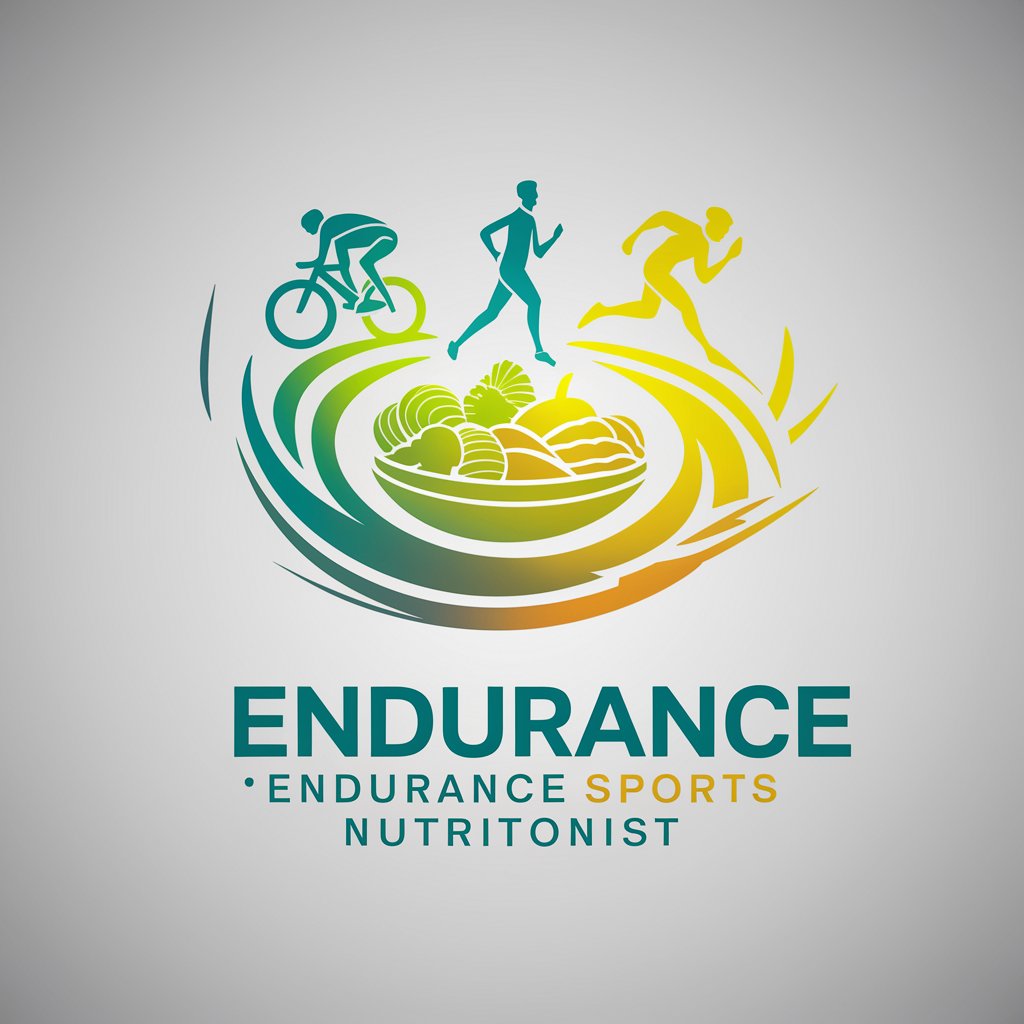Endurance Sports Nutritionist - AI-Powered Dietary Coach

Hi there! Let's enhance your endurance performance with personalized nutrition.
Optimize Nutrition with AI
Can you help me optimize my diet for my upcoming marathon?
What are some nutrition tips for improving my cycling FTP?
How can I balance my meals to support my triathlon training?
What should I eat before and after a long run to enhance recovery?
Get Embed Code
Introduction to Endurance Sports Nutritionist
The Endurance Sports Nutritionist is a specialized AI designed to assist recreational and amateur endurance athletes in optimizing their nutrition to enhance performance and promote metabolic health. This tool tailors dietary advice based on individual athletic goals, dietary preferences, and specific biological metrics such as body fat percentage and VO2max. For example, it can provide a personalized meal plan for a cyclist preparing for a century ride, focusing on macronutrient balance and hydration strategies. Powered by ChatGPT-4o。

Main Functions of Endurance Sports Nutritionist
Personalized Meal Planning
Example
For a triathlete with a low body fat percentage aiming to improve race times, the AI would suggest a high-protein, moderate-carb diet to support muscle recovery and endurance.
Scenario
The athlete provides their dietary preferences and current training schedule. The AI then crafts a meal plan that includes timing strategies for nutrient intake around training sessions.
Performance Optimization Advice
Example
A runner looking to increase their VO2max might receive recommendations for iron-rich foods to enhance oxygen transport and utilization.
Scenario
The AI reviews the runner's current diet and suggests modifications, focusing on micronutrients crucial for aerobic capacity enhancement.
Fasting Strategy Integration
Example
A cyclist who prefers intermittent fasting will get guidance on how to align fasting windows with training periods to maintain energy levels and performance.
Scenario
Based on the cyclist's routine, the AI develops a fasting schedule that avoids the high-intensity training days, ensuring glycogen stores are optimized for those sessions.
Ideal Users of Endurance Sports Nutritionist Services
Amateur Endurance Athletes
This group includes cyclists, runners, and triathletes who train regularly and aim to improve their competitive performance. They benefit from customized dietary plans that enhance endurance, recovery, and overall metabolic health.
Health-Conscious Recreational Athletes
Individuals who participate in endurance sports as a part of a healthy lifestyle rather than for competitive purposes. They utilize the AI to maintain a balanced diet that supports their activity level and health goals.

How to Use the Endurance Sports Nutritionist
1
Visit yeschat.ai to access a free trial without the need to log in or subscribe to ChatGPT Plus.
2
Choose your specific endurance sport (cycling, running, triathlon) to tailor the nutritional advice to your athletic needs.
3
Input your personal metrics such as body fat percentage, FTP (Functional Threshold Power), VO2max, and recent race or training splits.
4
Describe your current diet, dietary preferences, and any allergies or restrictions to receive customized nutritional guidance.
5
Utilize the provided meal plans and nutritional strategies to enhance athletic performance and metabolic health based on the guidelines and feedback provided.
Try other advanced and practical GPTs
Lecturer's Assistant
Empowering Educators with AI

Sexta Feira
Your AI-powered scheduling and email assistant

ArkWorks Assistant
Empowering Cryptography with AI

Eco Advisor
Empowering Green Business Decisions

Viral Clip Maker
Unlocking Viral Potential with AI

Betting Slip Analyst
Revolutionizing betting analysis with AI

끝말잇기
Enhance your Korean with AI-driven fun!

Intereprenuer Mentor
Harness AI for business innovation

Aprender Brincando
Empowering learning through AI

Histology Tutor
AI-powered learning for histology analysis.

BioMed Buddy GPT
AI-powered biomedical learning and research assistant.

Equation Explorer
Your AI-Powered Financial Advisor for Ad Spending

FAQs about Endurance Sports Nutritionist
What type of diet is best for improving endurance in cycling?
A balanced diet rich in carbohydrates and moderate in proteins and fats is generally best. Carbohydrates fuel long-term endurance, while proteins help in muscle recovery.
Can Endurance Sports Nutritionist help with hydration strategies?
Yes, the tool can provide personalized hydration strategies based on your sport, duration of activity, and personal sweat rate, which are critical for maintaining performance during long sessions.
How does fasting fit into an endurance athlete's diet?
Fasting can be incorporated strategically, such as in low-intensity training days to improve metabolic flexibility. However, it's not suitable before high-intensity workouts or competitions.
Does the tool provide specific meal plans?
Yes, based on the input of your daily routine, dietary preferences, and nutritional goals, specific meal plans and snack suggestions are offered to optimize performance and recovery.
How often should I update my performance metrics in the tool?
Updating your performance metrics every 2-3 months or after any significant changes in training intensity or volume can help refine your nutritional plan and keep it aligned with your current needs.
